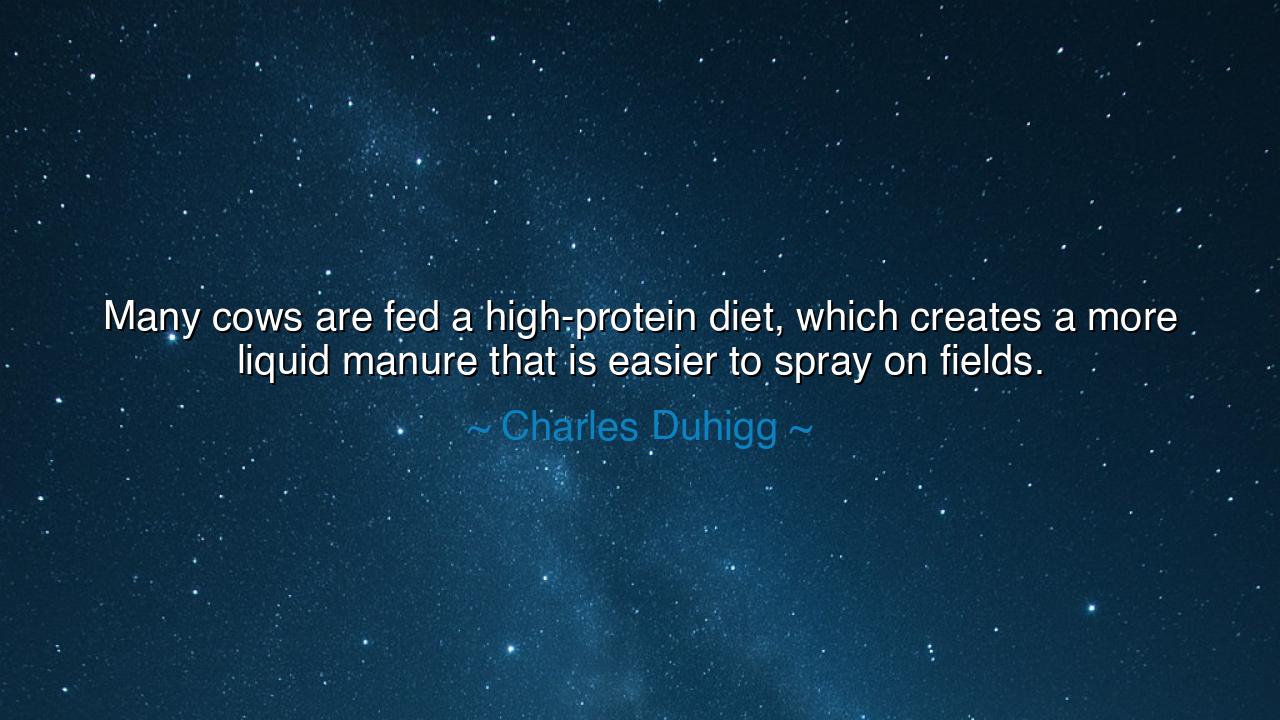
Many cows are fed a high-protein diet, which creates a more
Many cows are fed a high-protein diet, which creates a more liquid manure that is easier to spray on fields.






In the cycle of life, there is an ancient wisdom that speaks to the interconnectedness of all things—how what we feed into the earth, into animals, and into ourselves shapes the very fabric of existence. Charles Duhigg, in his words, draws attention to a simple yet profound truth about the consequences of diet and nourishment: "Many cows are fed a high-protein diet, which creates a more liquid manure that is easier to spray on fields." These words speak not only to the practicality of farming practices but to a deeper, poignant reality that the choices we make, even in the seemingly mundane aspects of life, have a cascading effect on the world around us.
The ancients, wise beyond measure, understood this principle—the ripple effect of actions, both intended and unintended. Consider the great philosopher Aristotle, who believed in the importance of balance and the interconnectedness of all things. To him, life was not a series of isolated actions but a web of influences, where every choice had a consequence. Just as Duhigg observes the effect of a cow's diet on the soil and the crops, Aristotle would say that the actions we take, whether in our daily routines or in our care for the earth, shape the world around us in ways we may not always understand. What is fed to the cow—what is fed to the earth—is absorbed by all who come into contact with it, creating a harmony or dissonance that resounds far beyond our immediate sphere.
In ancient Rome, the philosopher and statesman Cicero often spoke of the virtue of considering the long-term consequences of our actions. He understood that wealth, health, and prosperity could not be sustained through short-term gain but required a deep awareness of the flow between nature, resources, and human endeavor. The Romans, though known for their engineering marvels and military might, also revered the land and its cycles. Their commitment to sustainable farming practices, which included nurturing the soil rather than exploiting it, mirrored the teachings of Cicero. Like Duhigg’s observation of manure, the Romans understood that the choices made in one part of life—whether in the feeding of livestock or the care of crops—echoed throughout the rest of their existence, affecting the very ground they walked on.
This truth is further illuminated by the ancient story of Ceres, the Roman goddess of agriculture. She taught her followers that nourishment, whether of the body or the earth, should always be approached with respect, balance, and care. In the myth, her grief over the abduction of her daughter, Persephone, led to barren fields, and the earth became parched, reflecting the idea that balance must be maintained between giving and taking. Just as the goddess understood that every action upon the earth had its consequence, so too does Duhigg reveal that even the feed given to cows—the source of manure that nourishes the fields—has lasting effects. A simple change in diet, a seemingly small choice, ripples through the ecosystem, influencing not only the crops but the air, the water, and the soil.
As Duhigg notes, the high-protein diet of the cows creates a liquid manure that is easier to spread, but what is gained in ease of application is tempered by the larger question: what is lost in balance? The ancient Chinese sages understood this deeply. In the philosophy of Taoism, the concept of Wu Wei—non-action or action in harmony with the natural world—speaks to the balance that should guide all things. Every action taken, however small, should flow in harmony with the rhythms of the earth. Overfeeding animals or overexploiting land, they believed, would disturb the flow of life, leading to imbalance. The easy application of liquid manure, like many modern conveniences, may be tempting, but it may come at the cost of the delicate balance that nature demands. To feed the land without respect for its natural cycles is to invite the dissonance that will eventually lead to decline.
In this, Duhigg teaches us a vital lesson that the ancients have long known: all things in life are interconnected. The choices we make today—whether in how we nourish our bodies, the land, or the animals under our care—will have ripple effects that extend far beyond our understanding. Just as the cows’ diets affect the manure that will later fertilize the crops, so too do our small actions influence the greater cycles of life, often in ways we cannot foresee. We are not separate from the earth but deeply connected to it, and the health of one influences the health of all.
Let this lesson guide your actions in all aspects of life. Be mindful of the choices you make, understanding that each action has a consequence that ripples through your life and the lives of those around you. Whether in the foods you consume, the way you care for the land, or the relationships you foster, know that true balance comes from awareness, respect, and harmony with the world around you. Like the wise teachings of the ancients, let your choices reflect the understanding that we are all part of an interconnected whole, and in nurturing one part, we nurture all.






AAdministratorAdministrator
Welcome, honored guests. Please leave a comment, we will respond soon